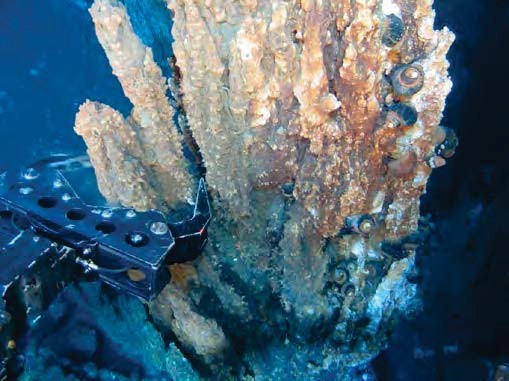![]()
The Cowrie – SIDS Times Magazine Fall 2017 Online Edition – Back to Table of Contents

PHOTO CREDIT- NAUTILUS MINERALS
Not until recently, the generic idea of ‘development’, in contrast to the notion of sustainable utilisation of natural resources, has generally been, conceptually restricted to areas within a State’s territory or jurisdiction 1 . Sustainable development was thus, perceived primarily in terms of endogenous economic growth and its linkages to social improvements. When oceans were considered for instance, it was usually either from a fisheries or food security perspective or because of concerns relating to marine pollution from ship or land based sources2.
Today, the governance of the “Area” (i.e. the seabed and ocean floor and subsoil thereof, beyond the limits of national jurisdiction), is slowly but firmly beginning to be understood by reference to sustainable development. The developmental, in contrast to the purely commercial objective and role of the International Seabed Authority (the Authority) to contribute to socio-economic development, within environmental limits, is gathering momentum. This is not a new phenomenon at all; it is an agreed idea as old as the United Nations Convention on the Law of the Sea (UNCLOS) itself.
The declaration in UNCLOS that the “Area” (which represents over 45% of the planet’s surface) and its resources are
“common heritage of mankind” 3 was a milestone in the realm of international co-operation.
The achievement of the goals UNCLOS as envisaged by
its framers, will contribute to the realisation of “a just and equitable international economic order which takes into accounts the interests and needs of humankind as a whole, in particular, the special interests and needs of developing countries, whether coastal or landlocked”4.
In line with Part XI of UNCLOS, four Pacific Small Island Developing States (PSIDS), namely, the Cook Islands, Kiribati, Nauru and Tonga, are sponsors of Entities that are now holders of Exploration License issued by the Authority, thus helping advance developing States’ interests and participation in deep seabed mining activities on an equal footing with developed States.
A study5 carried out by the World Bank, reveals certain capacity characteristics common to PSIDS in as far as their quest for deep-sea mining is concerned. These include but not limited to: capacity deficiency on collection and dissemination of geological and mineral resources data and information; varying and largely untested national laws and policies; weak understanding of appropriate environmental framework for deep marine environment; near total neglect of the social policies necessary for deep-sea mining to ensure adequate and commensurate benefit sharing; and institutional weaknesses across licensing, regulatory, compliance monitoring and revenue management.
Cognisant of these capacity characteristics, in a collaborative and deliberate disposition, UNDESA, dutiful to its role as the UN Secretariat’s upholder of the global development pillar, for today and tomorrow’s prosperity and the Authority, genuinely reverent of its mandate as the organizer and controller of activities in the Area, announced during the UN Ocean Conference in June 2017, a voluntary joint commitment to contribute to, facilitate and advance the implementation of Sustainable Development Goal (SDG) 14 and its associated targets, through capacity building initiatives targeting in particular, Small Islands Developing States (SIDS). This collaboration, in their own words, is a voluntary “abyssal relation”.
According to their respective capacity building mandates, UNDESA and the Authority will facilitate and organise meetings or events on “Blue Economy” in the Pacific during 2018 to define strategies and means to strengthen marine scientific research, formulation of appropriate policies, rules and regulations and other capacity building initiatives in order to better define the role of deep-sea mining in advancing national and regional sustainable development priorities, implementation of the 2030 Agenda and achievement of SDGs.
The fact that deep-sea mining has unknown associated risks has been a continued source of concern to many. Large-scale mining on land has a long and mixed history of contributing towards positive development outcomes, and resource-rich and/or resource- dependent nations have struggled to leverage natural resource development towards broader economic diversification and sustained growth. Resource development undertaken today will undoubtedly impact a nation for generations to come, therefore the need for good sector governance, strong institutions and highly skilled professionals to develop and implement sound policies, laws and regulatory oversight is paramount to deriving lasting benefits. These new abyssal relations aim to address this.
By Sainivalati Navoti Chief of SIDS Unit
Division for Sustainable Development UN DESA
sai.navoti@un.org
1 French D. “From the Depths: Rich Pickings of Principles of Sustainable Development and General International Law on the Ocean Floor-the Seabed Disputes Chamber’s 2011 Advisory Opinion” Int’l Journal of Maritime & Coastal Law 26 (2011) 525-568
2 Ibid.
3 UNCLOS, Art.136
4 Preamble – UNCLOS.
5 http://pubdocs.worldbank.org/en/125321460949939983/Pa cific-Possible-Deep-Sea-Mining.pdf